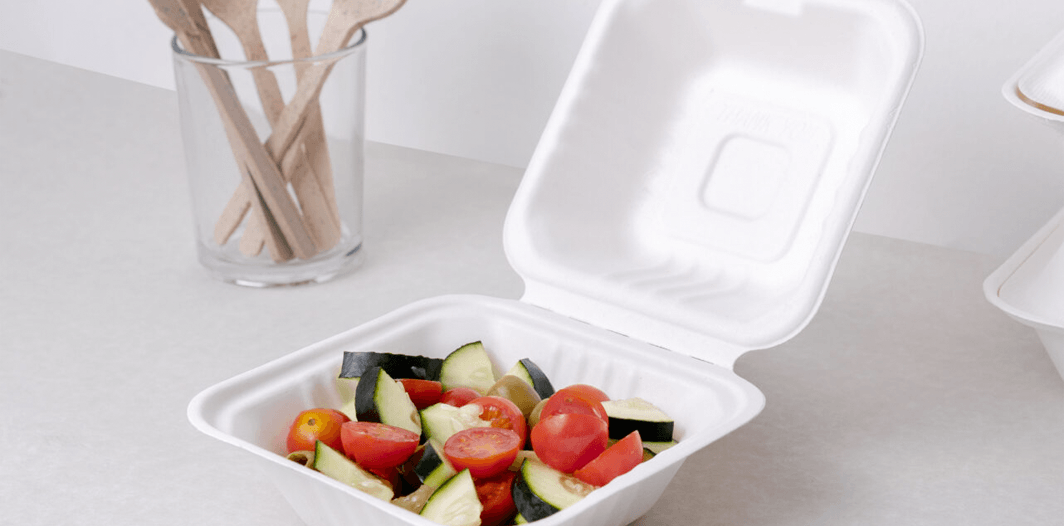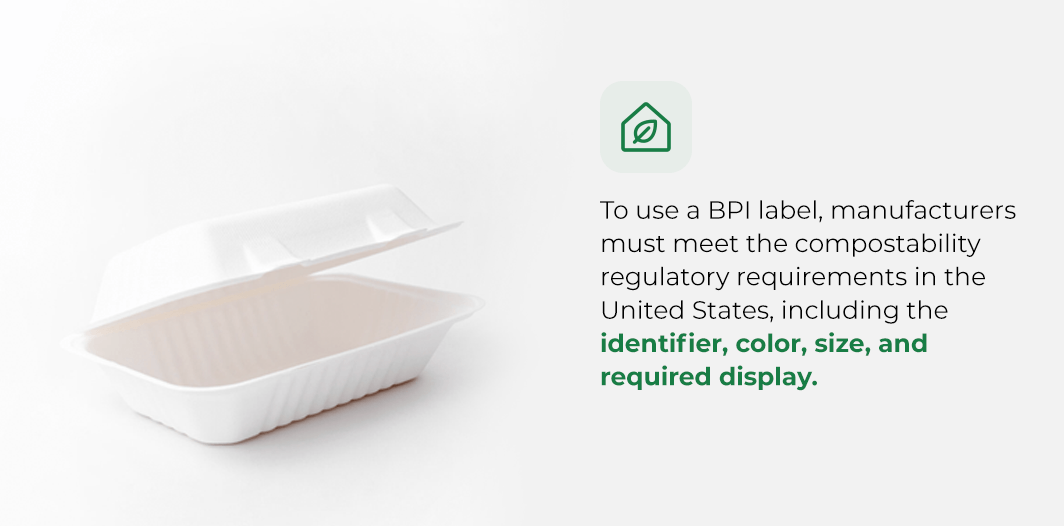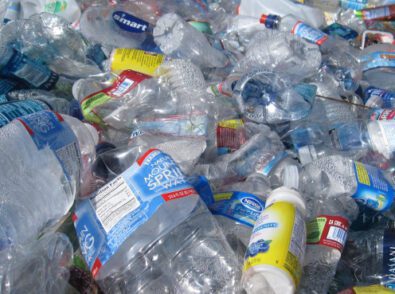Certified Compostable Products: What Are They and Why Do They Matter?

Content
- Defining Certified Compostable Products
- What Is the ASTM D6400 Standard?
- Examples of Compostable Bioplastics
- Home Compostable vs. Industrial Compostable
- Defining Marine and Landfill Degradation
- How to Identify BPI-Certified Compostable Products
- BPI Certification and You
- Take the Next Step Toward a Sustainable Future With Greenprint
The world is facing a plastic pollution crisis. Plastic is destructive and dangerous, polluting our oceans, waterways, and land, poisoning animals, and even finding its way into human blood where it may lodge in organs, damage cells, and lead to chronic illness or premature death. While recycling is an option for some materials, 85% of recyclable plastics still end up in landfills.
Compostable bioplastics have been introduced as an alternative to traditional plastics. These products are made from plant fiber such as sugar cane, agave, and cornstarch. Transitioning to bioplastics as a sustainable packaging solution significantly benefits organizations looking to meet sustainability goals.
Defining Certified Compostable Products
A compostable product is made from materials only capable of being processed by compositing, anaerobic digestion and other processes that result in decomposition by bacteria of other living organisms. While recycling plastics is one method of reducing plastic waste, compostable solutions provide consumers with an ethical alternative that eliminates the use of plastic products.
The Biodegradable Products Institute (BPI) has developed a certification that supports manufacturers in differentiating their compostable products and helps consumers choose them wherever possible. A BPI-certified product indicates users can cycle the item back into the soil safely at any commercial composting facility.
BPI plastic certification is a rigorous and detailed process. Materials must satisfy several stringent requirements to be defined as compostable, including:
- The product cannot be a redesign of a product better suited to recycling.
- The product should not have to be disassembled to be composted.
- The product must be compatible with organic wastes typically collected for composting.
BPI Labeling Requirements
One of the principal reasons certification exists is to help consumers identify compostable products and make informed choices. Consistent labeling allows users to identify, purchase, and divert compostable products away from landfills.
To use a BPI label, manufacturers must meet the compostability regulatory requirements in the United States, including the identifier, color, size, and required display.

Manufacturers can make claims of compostability, but without third-party certification, you have to take their word for it. BPI-certified compostable products will carry a certification mark that indicates they pass BPI standards and can be cycled through a composting program. Composters also use this standard to identify and eliminate products that may pose a risk to their composting operation.
What Is the ASTM D6400 Standard?
The ASTM D6400 standard covers plastics and products made from plastics designed for composting in municipal and industrial facilities. It establishes the requirements for labeling materials and products as compostable in these facilities. All compostable plastics aim to meet this standard, which informs BPI and other third-party certifications.
The ASTM D6400 aims to understand and assess what remains after composting by addressing factors such as soil toxicity, biodegradation, heavy metals and disintegration. It illustrates the differences between degrading plastics through the composting process and creating nutrient-rich soil.
Examples of Compostable Bioplastics
Identifying compostable bioplastics is essential to making informed decisions. Some examples include:
- Agave bioplastics: Agave is a spin succulent native to Mexico, often used to make tequila. Making agave bioplastics involves extracting the cellulose from the plant, upcycling plant waste from tequila production, and giving it another purpose.
- Cassava bioplastics: These plastics are made from cassava starch, vegetable oil, and organic resins for an utterly compostable option. They are a common alternative to plastic straws and shopping bags.
- Polyhydroxyalkanoates (PHA): PHA is a newer bioplastic offering a 100% renewable beginning-of-life process. It’s made from plant feedstocks, vegetable oils, sugars, and starches. The process involves bacterial fermentation, and the end product is an excellent alternative to plastic straws, bags, and cups.
Home Compostable vs. Industrial Compostable
A product may be suitable for industrial composting and simultaneously unsuitable for the same process at home. Industrial composting occurs in a proactively controlled environment and temperature with measured inputs of water, air, carbon, and nitrogen-rich materials.
Home composting involves additional variables, such as fluctuating temperatures, which lengthens the process. While it’s suitable for many of the same materials, such as paper, coffee grounds, food, and vegetable scraps, the setup is unlikely to reach high enough temperatures to decompose certified compostable food service ware and bioplastic bags.
Defining Marine and Landfill Degradation
Landfilling is a standard method for disposing of plastic waste at the end of its useful life, and what doesn’t end up in landfills travels downstream to the oceans. We consume up to 5 trillion plastic bags annually, and 39.7% of total plastic production is used for packing.
Plastic materials undergo considerable changes in their chemical structure in certain environmental conditions, which has numerous harmful effects on plant and animal species.
Plastics have been shown to concentrate pollutants up to a million times their level in surrounding seawater, where nearby animals and marine species ingest them. As plastic waste accumulates, it releases harmful gases like methane, contributing to climate change. The toxins released can also contaminate soil and groundwater.
How to Identify BPI-Certified Compostable Products
Products certified compostable by BPI are clearly indicated with the BPI certification mark. In addition to the BPI logo and mark, the item must also include:
- At a minimum, one additional compostable claim
- The name of the company or brand (such as the store it’s purchased from)
- Disclaimer or qualifying language as required by the Federal Trade Commission (FTC) and the Competition Bureau (CB)
The BPI mark and other components may be printed or embossed on the product, as long as it is clearly legible by both the consumer and the composter.
The concept of “qualifying language” simply means that composters, consumers, and end users can identify the product as compostable. In the case of consumer products, such as food service containers, drink cups, cups, lids and bags, the language can include instructions on how to dispose of the item. All such language must meet BPI’s “readily and easily identifiable” requirements and are intended to make it easy for stakeholders to know how to dispose of the product.
BPI Certification and You
The plastic waste crisis is overwhelming in scope, but if everyone plays their part, we can move in a positive direction. Awareness is the first step as it allows us to make conscious choices about the products we use and purchase.
Whether you compost in your backyard or use a curbside program, it’s useful to know what you can and can’t include. BPI certification is an easy way to identify products you can put in your curbside bin. The BPI mark lets you know that the disposable products you use can be safely composted. It also allows the composter to properly sort compostable waste and avoid including non-compostable products that might contaminate the mix.
Look for the BPI Certified Compostable mark where you shop. If your favorite restaurant is not yet using compostable containers, don’t hesitate to speak up. We must all do our part to make the world safer for future generations.
If you can compost, either through a curbside program or in your backyard, it’s time to commit to using compostable products vs. other types of single-use plastics. Without composting facilities, do your best to reduce, reuse, and recycle as much as possible. Working together, we can make a difference.
Take the Next Step Toward a Sustainable Future With Greenprint
Using compostable products is vital to protect our environment for the future. With help from Greenprint, you can make your move towards creating a sustainable future. Our commitment to constant innovation means we offer a growing catalog of environmentally friendly products focusing on incorporating plant products.
Everything we offer has been internationally certified to ensure you can make informed decisions about what you use in your home and business. Contact us today to learn more about our sustainable disposal industry ecosystem.
References
- https://www.theguardian.com/environment/2022/mar/24/microplastics-found-in-human-blood-for-first-time
- https://www.smithsonianmag.com/smart-news/the-us-recycled-just-5-percent-of-its-plastic-in-2021-180980052/
- https://bpiworld.org/why-bpi
- https://bpiworld.org/before-you-start
- https://bpiworld.org/using-the-bpi-mark
- https://www.astm.org/d6400-21.html
- https://www.epa.gov/recycle/composting-home
- https://www.ncbi.nlm.nih.gov/pmc/articles/PMC9602440/
- https://www.britannica.com/science/plastic-pollution/Plastic-pollution-in-oceans-and-on-land






